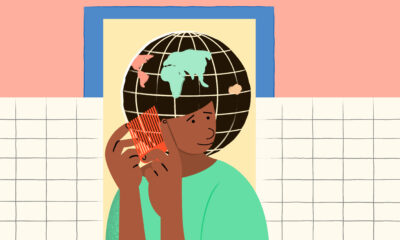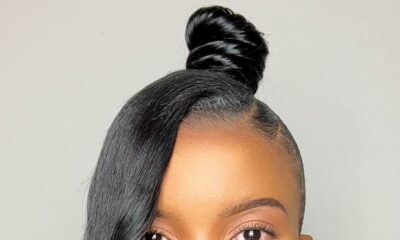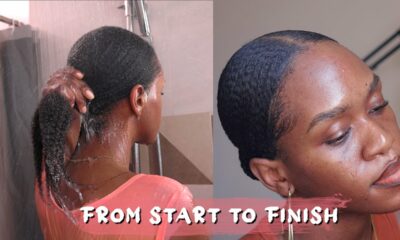Features
Ainehi Edoro: Hair Is an Emblem of Beauty, But It Is Also Political
 Fela Kuti once considered opening up a beauty shop. Shocking. I know. I also know that you are finding it difficult imagining Fela shuffling around in a room full of women with a comb in hand and an apron hanging over his neck.
Fela Kuti once considered opening up a beauty shop. Shocking. I know. I also know that you are finding it difficult imagining Fela shuffling around in a room full of women with a comb in hand and an apron hanging over his neck.
If Fela never got the chance to become a hairdresser, it had nothing to do with his abilities. I think Fela would’ve done just fine as a hairdresser.
It has everything to do with the fact that, like everything Fela, the concept for the salon is pretty off-the-wall strange. Fela had in mind a salon that would cater to women’s pubic hair only.
As absurd as this all sounds, one thing Fela and Chimamanda Adichie have in common has something to do with this crazy idea of a pubic hair care shop.
In a 1988 tune titled Big Bling Country, there is a section where Fela takes up the issue of hair. {You can listen HERE}
He begins with a simple observation:
You see the educated women
All those wey dem don go for school oh
Na oyinbo hair dem dey knack for head
Dem hair dey shine shine pass polish oh
Dem get one wey dem call permy
The other one dem dey call jerry-curly oh
Because dem dey for blind country
Dem dey spoil themselves with this style oh
But then he ends with a very racy question:
I asked dem say
As dem dey perm their hair, toto hair nko?
You go perm that one too?
Dem tell me no.
so, the hair of toto, is different from the hair of head?
And an even racier conclusion:
Ah, na wa oh, make dem no go start to dey perm the hair of toto
Because na dat time, me sef I go open shop
Oh oh, ye paripa
Fela, though? Who, but Fela, would says something like this: “#NoteToSelf: If African women ever take to straightening their pubic hair like they do the hair on their head, I’ll make sure to open a beauty shop.”
By the way, don’t get distracted by Fela’s reference to “educated women.” Fela has nothing against women being educated. His target here those women who mistake a blind imitation of the West for enlightenment. As Funmi Iyanda said on Twitter the the other day, “civilization is not westernization.”
But you get Fela’s point, right? He is pointing to the absurdity of a disorganized body where the hair up there is straight while the one down there is not. Don’t mind Fela. He clearly didn’t get the memo that shaving is always an option.
On a more serious note, though, Fela is obviously puzzled that African women would straighten their hair, which he can’t help but see through a racial lens. They wear white women’s hair, Fela observes. “Na oyinbo hair dem dey knack for head.”
Adichie, in a sense, clarifies for us the reason why Fela is puzzled. For Fela, as with Adichie, hair is political. “Hair,” Adichie tells us, “is not just hair, particularly for women. For white women, it’s color. For black women, it’s much bigger. It’s texture.”
Hair is an emblem of beauty. And in today’s image-obsessed world, beauty is, more than ever, a political matter. It’s just that the politics of beauty as it pertains to hair is also a politics of race. Why? Because hair, historically, has always been a signature for racial difference.
Try not to take it personally. This whole talk about hair and race has nothing to do with your personal intentions. The point is not whether you consciously wanted to make a statement about race when you put on that straight-hair wig or decided to rock your Marley braids instead. Whether you are conscious of it or not, hair texture has always had racial meaning.
I know what you’re saying: “These academics have come again, over analyzing things, making a mess of things.”
Perhaps you’re right. To be frank, when it comes down to it, none of all this means that chemically processing ones hair or carrying a straight-hair weave is bad while natural hair is good. No one should dictate to a woman what should make her feel beautiful.
But, then, we also can’t deny that the aspiration towards straight hair is now so widespread that the dominant form of black feminine beauty—from Genevieve Nnaji to Beyonce—has now become synonymous with straight hair.
So what would I like to take away from Fela and Adichie’s conversation?
The fact that straight hair has become a universal emblem of feminine beauty for women of all races is, at least, something we need to talk about—without necessarily making prescriptions about what kind of hair is “good” or “bad” hair.
Photo Credit: Dreamstime | Sam74100

























